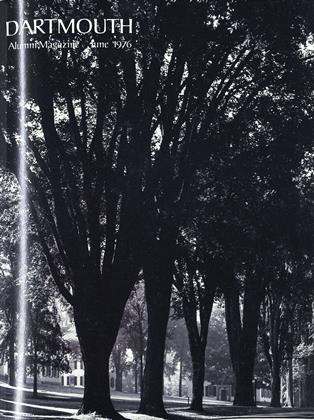Breathes there an alumnus - or student - who at one time or another has not contemplated wistfully the glory of a Hanover May sans class, sans term paper, sans final? To soak up, according to one's proclivities, rays or beer or the wealth of entertainment, athletic, cultural, and intellectual, so temptingly available, free of the demands of the nine o'clock bell or all-night booking?
Beyond the rich fare of movies, concerts, exhibitions, and plays offered by the Hopkins Center, beyond the varied sports formal and informal and the departmental symposia, this May brought a number of very special events: Professor Emeritus Arthur Wilson's Bicentennial lecture on the dynamism of the Declaration of Independence, a portion of which appeared in our last issue; the Ray Winfield Smith lecture series on the "Origin, Development, and Future Prospects of Man"; the Classics Department's production of the Latin play Truculentus, presented at the Medical School with a cast of faculty and townspeople.
The four-year lecture series, a gift of Egyptologist and adjunct professor Smith 'l8, this year concentrated on the current status of man. Professor John S. Major, a specialist in eastern intellectual history, warned us to think small in a talk on "Technical Maturation and the Impulse To Go Beyond." Director of galleries Jan van der Marck examined the present state of "Man and Art." Smith spoke about "Forgotten Peoples of the 20th Century," and former Dartmouth anthropologist James Fernandez on "Man in the Third World: The Little and Great Traditions." Next year: man's future, what kind and for how long.
Smith's beneficence reminds us of the extraordinary diversity of programs- curricular and extra-curricular, scientific, cultural, and technological - made possible by the largesse of public and private sources. A sampling of special grants and endowments announced in recent weeks is illustrative. An $80,000 National Foundation grant, augmented by funds given earlier by the Gilman Foundation, will purchase a scanning electron microscope to be used by the biological sciences department, the Medical School, and the hospital. Another NSF grant will support the continued study of coal as a transitional fuel by a group at the Thayer School, with the cooperation of personnel from Tuck and environmental studies. The National Institutes of Health awarded a five-year grant of $265,602 to Professor Roy P. Forster for basic research in the physiology of the kidney. A new Kathe Tappe Vernon Chair of Biography has been established under the will of Ambrose White Vernon, former pastor at the White Church, professor of Biblical literature, and founder of the biography departrment. The Exxon Education Foundation has granted the College $87,500 to design and develop a computer-based system for retrieving visual information, to be used first by the art and earth sciences departments and by the Hopkins Center galleries. The Lilly Endowment has provided $69,799 for a three-year project to support master-apprentice teams aimed at improving teaching effectiveness.
 View Full Issue
View Full Issue
More From This Issue
-
 Feature
FeatureA four-and -a-half-ounce magic totem pole
June 1976 By NORMAN MACLEAN -
 Feature
FeatureTHE OLD ROMAN SPEAKS TO US STILL
June 1976 By DAVID SHRIBMAN -
 Feature
Feature231 Years for Dartmouth
June 1976 -
 Feature
FeatureCommencement
June 1976 By JAMES L. FARLEY -
 Article
ArticleCollege with an Upper-case "C"
June 1976 -
 Class Notes
Class Notes1959
June 1976 By DOUGLAS WISE
Article
-
 Article
ArticleDartmouth Night Wires
April 1939 -
 Article
ArticleCollege Naturalist Leaves
November 1942 -
 Article
ArticleMore Married Men, More Children
June 1955 -
 Article
ArticleTwo Staff Appointments
FEBRUARY 1970 -
 Article
ArticleFall Activities of Cabin and Trail
January 1949 By Dean S. Worth '49 -
 Article
ArticleWashington
October 1959 By JAMES W. JONES III '50, BOB DEBRUYN '55

